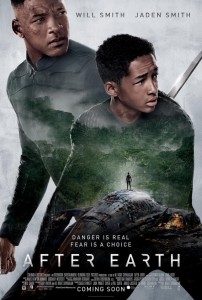After Earth (2013)
Columbia Pictures
Director: M. Night Shyamalan
Main Cast: Jaden Smith, Will Smith
Here is a sci-fi film with an interesting core premise, burdened by all the usual plot holes of a typical M. Night Shyamalan feature. Humanity makes the Earth’s environment essentially uninhabitable, and the planet’s population moves to a new planet called Nova Prime. Some other alien species tries to remove humans from Nova Prime (for reasons not explained in the film) by attacking them with genetically engineered monsters called Ursa, which relentlessly attack humans by detecting pheromones given off when humans are frightened. Cypher (Will Smith) is a general in the Nova Prime military, and his son Kitai (Jaden Smith) wants to follow in his father’s footsteps. However, Kitai is troubled by having seen his sister killed by an Ursa. So, father and son go on a space voyage and an “unexpected” asteroid belt causes the spacecraft to crash land on a planet that turns out to be Earth. There were only two survivors. To raise a rescue beacon, they must reach the tail section of the craft that landed some number of miles away from where Cypher and Kitai landed. But Cypher has broken his legs, so Kitai must make the journal alone. And an Ursa that was being transported in the craft has survived the crash too, and gotten loose.
The story line is fairly typical “son must prove himself to a military father” one. Those plot holes? Well, here are a few. How would an asteroid be unknown and undetected, so close to the human home world? When Cypher injures his leg, why is he unable to apply a tourniquet, a technology known for millennia? If the Ursa are practically blind except for their pheromone sense, how are they able to walk about without crashing into things? And are they also mostly deaf? Why must the Ursa be fought practically hand-to-hand, rather than using tanks, missiles, robots, and the like? And with all the new technologies, it strains credibility that the characters are so unfamiliar with it that they are inclined to offer explanations (for the benefit of the film’s audience).
Will Smith’s acting is wooden. He was always better in comedic roles. Jaden Smith is terrible, and devoid of acting ability. So why watch this film? There are great special effects. If you can set aside the bizarre forgetfulness when it comes to “ancient” technologies like tourniquets, there are a few interesting concepts, like flexible and holographic computers.
What makes this movie decent, in spite of its flaws, is the psychological basis for the main plot point. Kitai must overcome his fear of Ursas to accomplish “ghosting”, by overcoming fear and avoiding the release of pheromones to pass by them as if invisible. The very notion of “ghosting” is ridiculous. But the idea that you have free will as to how you subjectivize objective experience is a key concept of psychology:
“[M]an is not simply a product of objective circumstances. We all have this margin of freedom in deciding how we subjectivize these objective circumstances, which will of course determine us.”
Kitai has to decide whether in response to the very real and objective threat of the Ursa whether he subjectivizes that circumstance through fear, or another way. In one very anthropomorphic scene, too, Kitai is saved by a giant eagle who chooses to protect him from severe cold that occurs every day, who manifests the same phenomenon. She chooses to protect Kitai after loosing all her babies in an attack by jaguars or some such mutated large cats. A “protector of the weak” is how she wanted to be seen by others. So the basic message of this film is a defensible one.

